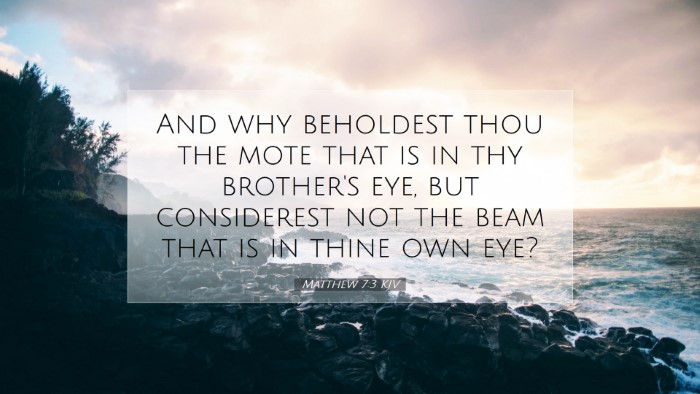Commentary on Matthew 7:3
Verse: "And why beholdest thou the mote that is in thy brother's eye, but considerest not the beam that is in thine own eye?"
Introduction
This verse is part of Jesus’ Sermon on the Mount, where he teaches the principles of judgment and self-examination. The imagery of the "mote" (a small speck) and the "beam" (a large plank) serves as a powerful metaphor for hypocrisy and the human tendency to overlook our own faults while scrutinizing others.
Insights from Matthew Henry
Matthew Henry emphasizes the folly of self-deception and the critique of others without self-reflection. He notes the contrast between the "mote" and the "beam" as a representation of how we often exaggerate the failings of others while minimizing our own:
- Self-Examination: Henry argues that self-examination is crucial. Before one can rightfully point out the faults of others, it is essential to assess one's own spiritual state.
- The Nature of Judgment: He discusses the idea that how we judge others inevitably reflects on ourselves. To harbor rigid judgment towards others indicates a blind spot regarding one’s character.
- Call to Humility: This passage calls for humility in all interactions, suggesting that a humble heart should foster compassion instead of condemnation.
Insights from Albert Barnes
Albert Barnes provides a theological and practical perspective on this teaching. He emphasizes Jesus’ strong rebuke of hypocrisy:
- Hypocrisy in Judgement: Barnes points out that the act of criticizing others while harboring greater faults is a form of hypocrisy that dishonors God.
- Spiritual Insight: The illustration of the mote and beam serves as a call to possess spiritual insight. Christians ought to seek God's grace to remedy their own issues before aiming to correct others.
- Plea for Compassion: Moreover, Barnes urges readers to exercise compassion, suggesting that true discipleship reflects understanding and the willingness to aid others rather than condemn them.
Insights from Adam Clarke
Adam Clarke provides an exegetical analysis of this scripture, shedding light on its linguistic and cultural context:
- Contextual Understanding: Clarke notes that the phrase "mote" and "beam" illustrate enormity. This juxtaposition is meant to help believers recognize the absurdity of their judgments.
- Instruction Against Faultfinding: He articulates that the lesson is not an endorsement of ignoring sin, but rather an instruction against faultfinding—encouraging believers to engage in self-reflection.
- Call to Personal Responsibility: Clarke stresses the importance of taking personal responsibility for one's actions and the necessity of addressing one’s own flaws first as a prerequisite to helping others.
Theological Implications
The implications of this verse touch upon the broader themes of Christian living, which emphasize relationships, integrity, and the transformative power of grace:
- Interpersonal Relationships: This teaching underlines the importance of maintaining healthy interpersonal relationships amongst believers. The act of judging without introspection can lead to division.
- Integrity and Authenticity: The Christian community is called to live with integrity. This passage highlights the necessity for authenticity in faith, encouraging believers to be aware and mitigate their own faults diligently.
- Grace and Restoration: The central message advocates for an attitude of grace. The process of confrontation regarding sin should be handled with love and the aim of restoration rather than condemnation.
Practical Applications
For pastors, students, theologians, and Bible scholars, this passage offers several practical applications:
- Self-Reflection: Regular self-reflection is crucial for spiritual growth. Encouraging congregants to spend time in contemplation of their own faults can foster a more authentic faith community.
- Preparing for Accountability: Leaders should guide their communities with humility and openness, promoting transparent discussions about personal and communal failings.
- Compassionate Correction: When addressing the faults of others, believers should approach the situation with love, emphasizing healing rather than merely condemning behavior.
Conclusion
Matthew 7:3 provides a compelling call to believers to examine their own lives before passing judgment on others. By engaging sincerely with this verse, Christians can cultivate an environment of humility, compassion, and integrity. As the teachings of Matthew Henry, Albert Barnes, and Adam Clarke suggest, the path to a harmonious and productive Christian community begins with self-examination and grace-filled interactions.


